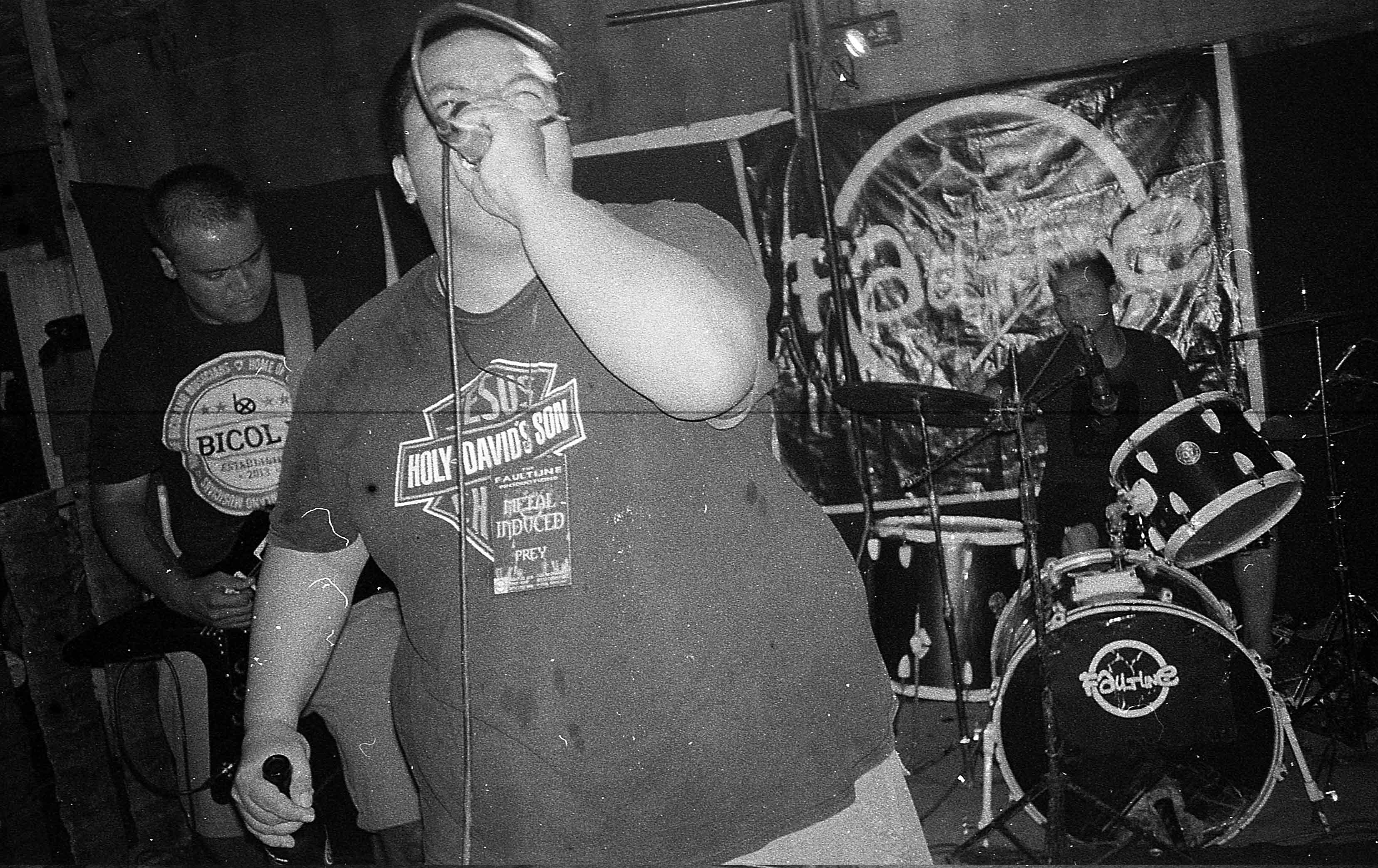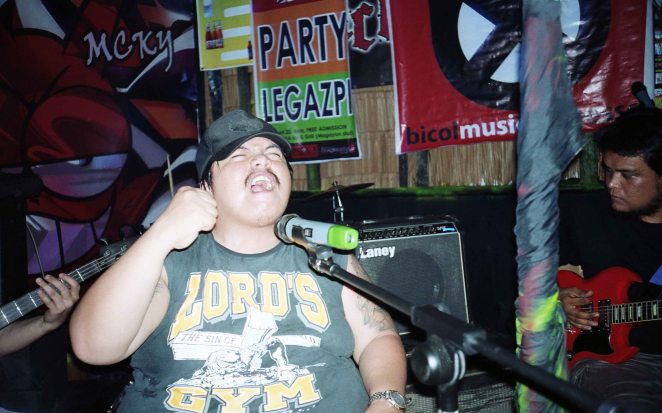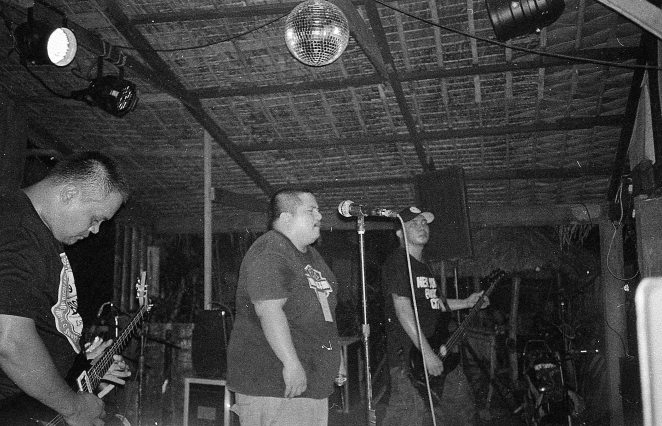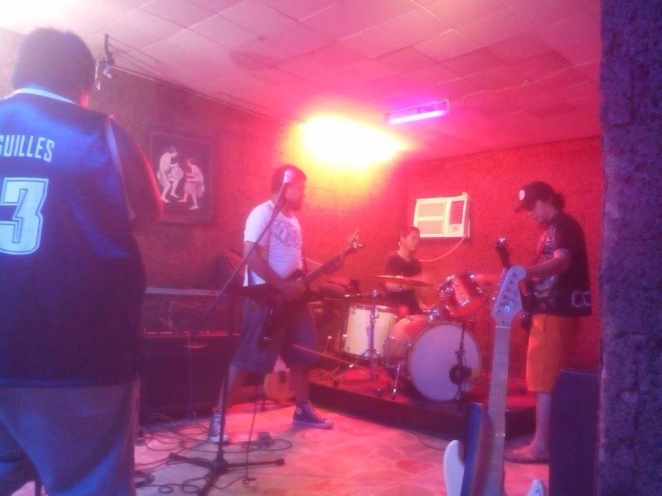To Prey Or Be The Prey?
That is Not the Question
Weng Laguilles
Based on an interview with Paulo Laguilles and Serafin Timog, III and anecdotes from Julius Masbate and Mark Pineda
One of the bands to come out in recent years, four-piece metal band Prey nevertheless presents more than newness to the music scene. They have been part of separate bands playing within and outside Legazpi City for ten years and more, and proof of the rich music-making experiences behind them is hard to miss. For anyone that listens to their songs and watches their performances, they promise only well thought-out pieces, creditable performances, and unquestionable passion.
Becoming Prey
Vocalist Paulo Laguilles (Burf), bassist Julius Masbate (Yapak), and drummer Mark Pineda (Pot) come from a common band, Negative 13th X-Ray. While itself a considerable success with endless gigs in and out of town, a cult following of their own, and original songs that have become familiar with music scene supporters, Negative 13th X-Ray had come to a halt in 2012 when school and work demands took their toll on the members. But even as the band was beginning to slow down, they were already eager for a new chapter. In fact, members of the Negative 13th X-Ray had always challenged themselves, exploring musical terrains that could match their zeal. After trying things out with a few guitar players around town, Serafin Timog III (Serf) seemed like the natural choice for a permanent guitarist. An old hand in the music scene himself that needs a new challenge, Serf was more than interested in the synergy that will become Prey.
Playing metal seemed a natural path for these four home-grown musicians. Burf, Yapak, and Pot had started out playing punk music (Trigger Happy, Story So Far, Morons) in as early as 2004, but over the years had also continually searched for something that was heavier and perhaps for them, more musically challenging. With separate bands and as Negative 13th X-Ray, they had also played metal music, but they had come to a point of simply wanting more to do with it. In fact, Yapak had also started playing bass for other metal bands (Perdition, Jack in the Box, Dark Dungeon) around the same time Prey got together. Similarly with Serf, it was never about swearing to any one genre, his long line of music-making experiences running from involvements with blues to pop and acid rock to metal (Voltes V, Volume, Next Level, Sperm, Angelic Rebellion, Pepsi Paloma Experiment) since his high school days in 1998. And like his band mates in Prey, taking metal seriously was simply due. Prey’s first gig was in October 2013. They have continued playing ever since, and one of their songs is set to be part of Bicol X’s compilation album for release in mid-2015.
Dodging Haters
As with any endeavor, plunging into the music scene invites supporters as well as haters. This is true for Prey. While one easily feels the support the bands gets with how people gather in a moshpit or simply bob their heads along as Prey takes over the stage, one also senses some sort of resistance to their presence. In fact, Prey had been questioned of their claim to being a metal band, which Burf explains is on account of how their musical history, lifestyle, and attitudes are apparently “not metal enough.” Prey normally laughs these issues off, but when pressed for comment, they reveal what they see as the irony in such attack. Particularly for Serf, there are a couple of problems with genre purists in the local scene: boxing music into categories in the first place, and self-righteousness over a genre which is actually foreign and thus for which no Filipino will ever be ‘pure’ enough.
Nevertheless, Prey is not out to please everybody; appealing to those with open ears will do. Burf admits though that unfounded criticisms can sometimes invade their time and energy as they try to understand what these haters are really about. For him, it is acceptable for musicians to engage in constructive criticism with each other. Disliking another band’s music is okay, he says, and if you really can’t hold your tongue, you should focus your critique on the music, not the people behind it. Indeed, to critique another band to be unfit for playing a particular sound based on personal circumstances is to hold them against a biased set of qualifying criteria and to claim superiority to be the judge as well. And in the world of music, in the world of art, claiming to have the final say is nothing more than ignorance as it is arrogance.
What It’s Still About: Making Music
To date, Prey has written three songs, Bully, Underdog, and Vengeance, all of which started with guitar riffs from Pot. They are also currently working on one song, The Enemy Needs to Die. Lyrically, they derive inspiration from personal experiences and perspectives on bullying. They acknowledge that bullying is commonly experienced among the youth, and they too have accounts of having been bullied. Burf shares that his most challenging experience was in high school, where it took him a whole school year before he could stand up to a group of upperclassmen that ganged up on him. They stress however that bullying takes place everywhere and happens to everyone. Serf cites bullying in the corporate world in particular, where employees hardly get a say over their work circumstances, being underpaid and overworked the cruel and simple reality for many. Their sentiment on the matter is punctuated by the need of the bullied to stand up for themselves. Musically, they are influenced by bands such as Pantera and groove metal music in general.
Prey intends to record an EP soon, featuring their four songs and possibly a couple more. But their plans as a band are not set in stone just yet, as they have other responsibilities on their hands as well. Given that such situation is the same for most other local bands, one wonders how they manage it differently considering their maturity as musicians. Reflecting on his past bands, Burf admits Prey is more focused as a group of musicians, but is more relaxed as a band. Their rehearsals can be dead serious, each one keen on playing their parts the best they can; but they can be just as self-indulgent when they brainstorm over an original song, learn a cover, or perform onstage. Burf adds that he also knows better now than to expect that things will always go with the band the way he wants them. Working for it one day at a time works better than predicting the band’s future.
For Prey, “passion for music” remains the catchphrase explaining their motivation as a band. Serf elaborates that without music, life just seems incomplete. More than just passion though, Prey has enough experience to teach them that the quality of the music one makes matters equally. Musicians do not exist solely for themselves, and the music they offer must be worth listening to. Reaching for another cliché that happens to be true, Yapak adds three basic things any self-respecting band needs to ensure, regardless of the genre they are associated with or that they identify for themselves: “practice, explore, create.”
About The Author
Weng writes songs and plays the guitar for The Doldrums. She is also among the founders and organizers of Club Molotov. She considers herself a feminist, an atheist, and an academic. She likes well-spiced and fresh seafood, which makes her feel fortunate having Legazpi City as her hometown.



